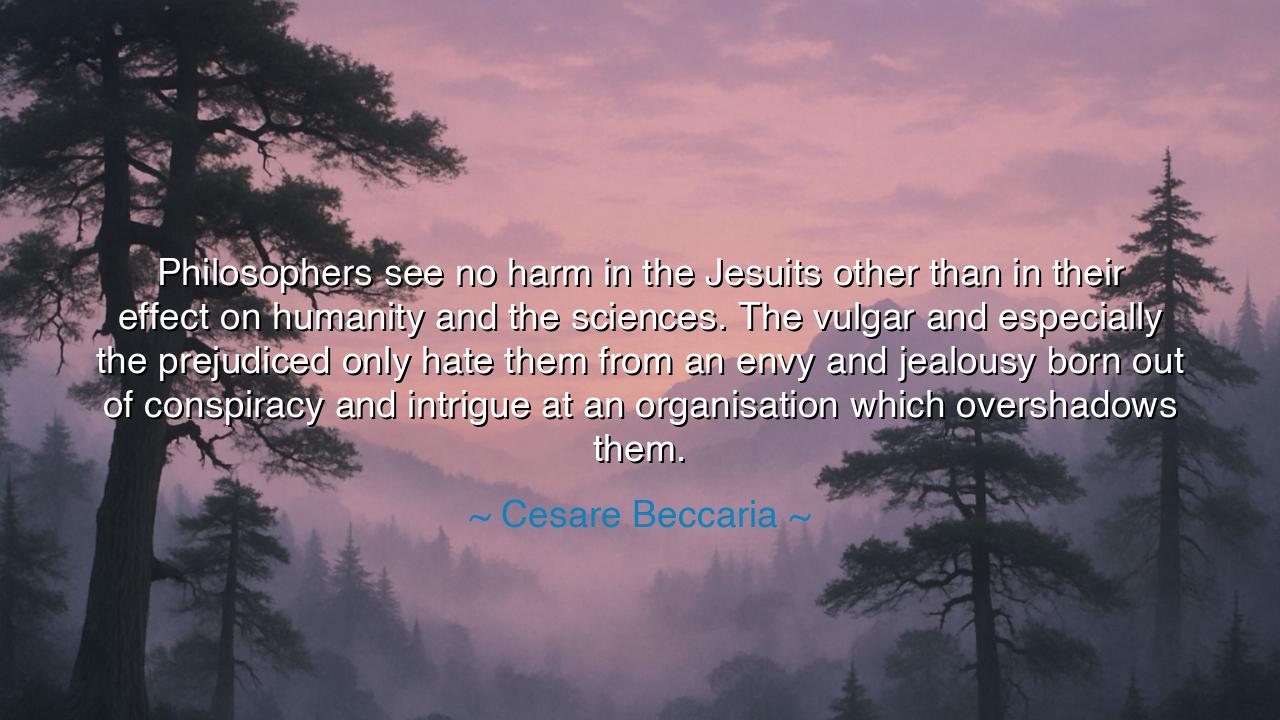
Philosophers see no harm in the Jesuits other than in their
Philosophers see no harm in the Jesuits other than in their effect on humanity and the sciences. The vulgar and especially the prejudiced only hate them from an envy and jealousy born out of conspiracy and intrigue at an organisation which overshadows them.






In the words of Cesare Beccaria, the great reformer and philosopher of justice, there resounds a wisdom both sharp and enduring: “Philosophers see no harm in the Jesuits other than in their effect on humanity and the sciences. The vulgar and especially the prejudiced only hate them from an envy and jealousy born out of conspiracy and intrigue at an organisation which overshadows them.” Beneath this statement lies not only an observation of his own age, but a timeless truth about power, intellect, and envy. Beccaria, who lived in the Enlightenment — that era when reason dared to challenge dogma — saw with clarity that hatred is rarely born of understanding, but often of fear and jealousy.
In his time, the Jesuits were a mighty order — scholars, missionaries, and teachers whose influence stretched across continents. They were men of learning, discipline, and ambition; yet they were also controversial, for their allegiance to the Church and their power in courts and classrooms alike made them both admired and despised. Beccaria, ever the rational observer, distinguished between two kinds of judgment: that of the philosopher, who critiques through reason, and that of the vulgar, who condemns through envy. The philosopher, he says, sees fault in the Jesuits only where they hinder humanity and the sciences — that is, when they restrain free inquiry or cloud truth for the sake of authority. The rest, he claims, hate them not from principle, but from jealousy, because their brilliance and organization cast too long a shadow upon lesser minds.
This distinction is eternal. Throughout history, those who rise through discipline and unity — whether scholars, inventors, or visionaries — are often met not only with admiration but with resentment. The Jesuits, with their schools and intellect, were to the eighteenth century what great innovators are to ours: lightning rods of suspicion and targets of envy. Beccaria’s insight teaches that most hatred in the world is not moral but emotional; it springs from the smallness of spirit that cannot bear to see others excel. The philosopher seeks truth even from his rivals; the vulgar soul seeks only to see his rival fall.
We might recall the story of Galileo Galilei, that shining mind who turned his telescope toward the heavens and saw the planets move not as priests had said, but as nature decreed. The Church condemned him — yet many of his harshest critics were not defenders of faith, but envious scholars, frightened that his discoveries would eclipse their fame. Their jealousy masked itself in righteousness, their fear clothed itself in orthodoxy. This is the very disease Beccaria names: the envy that disguises itself as moral outrage, the resentment that destroys what it cannot equal.
But Beccaria, ever the moderate, did not speak to destroy faith or the Jesuits themselves. He spoke to warn against blind hatred, which feeds upon itself and blinds men to wisdom. He saw that knowledge is a delicate balance: too much authority stifles it, but too much envy tears it apart. The Jesuits, with all their faults, represented the disciplined pursuit of learning; their critics, when driven by jealousy, represented ignorance clothed in pride. Thus, Beccaria reminds us that in all ages, truth must defend itself not only from tyranny but from pettiness, from the envy that corrodes the soul before it ever touches the world.
The lesson, then, is clear: let us be philosophers, not the vulgar. Let us critique with reason, not with resentment. When we see greatness in others, let us not shrink into envy but rise into admiration, learning what we can from their light. For envy is the confession of inferiority, while understanding is the path to equality. To despise what is excellent because it is beyond our reach is to choose darkness over dawn. The wise instead look upon greatness as a guide — a mountain not to curse, but to climb.
So, my listener, remember the wisdom of Cesare Beccaria. When you meet power, judge it by its deeds; when you meet knowledge, judge it by its truth; but when you feel jealousy stir within you, recognize it as the whisper of weakness. Cast it aside, and choose instead the higher way — the way of reason, humility, and understanding. For the philosopher, as Beccaria teaches, fears no shadow — he knows that every great light, however blinding, only shows the path by which humanity may ascend.






AAdministratorAdministrator
Welcome, honored guests. Please leave a comment, we will respond soon